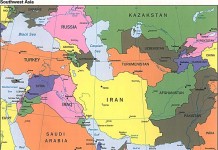Context

Iran was the central theme of a meeting between US President Barack Obama and Israeli Prime Minister Benjamin Netanyahu on March 5, 2012. The two leaders exchanged reassurances of support each for the other; however their biggest difference of opinion remains how to tackle Iran.
The Iranian issue remains a strong point of convergence as well as divergence for the Israel and the US. US President Barack Obama met with Israeli Prime Minister Benjamin Netanyahu for an extended talk at the White House, but neither appeared to budge from their underlying positions: Obama that a sequential, ideally diplomatic solution is best. Netanyahu that Israel will strike, the only variable is at what time.
While the Israeli leader did not back down on his talk of a strike against Iran, he did say it was no longer a ‘matter of weeks’ that the event will take place. He curbed this, however, by also stating that it was also not ‘a matter of years.’ So no action in the immediate future, but there is the distinct possibility in a relatively short time.
Analysis
First Things First
For the US, dealing with Syria, specifically getting rid of Bashar al Assad is a premium objective before tackling Iran. Not only is the Syrian situation more pressing, but ridding Syria of al Assad is also removing a staunch ally of Iran. With no view of a stable government being formed in Syria quickly, a country in disarray will serve US interests in Iran, especially as a country in chaos is perhaps more palatable than the possibility of a new government with the same sentiments toward Iran and Israel as the al Assad government.
The US is also keen to wind things up in Afghanistan before turning fully to the Iranian problem, particularly if that will require use of military force. The US will want to prevent being military engaged in more than one area, and thus being overstretched as well as overtaxing the American population’s stomach for war. There would also have to be a clear and distinct approach to any action in Iran, as Pakistan has avowed to side with Iran in the event of an attack, and so the US would no doubt be denied the supply routes and presence it has enjoyed in Pakistan to support the Afghanistan war.
Furthermore, the US and the EU are putting a lot of effort into their sanctions regimes against Iran, so they will be calling for a stay of any military action to determine how effective these new sanctions can be in coercing Iran into cooperation on the nuclear issue. Already some positives have come out of it, with a positive response from Iran to the EU Foreign Policy Chief Catherine Ashton letter of invitation back to negotiations.
Ashton wrote in her reply to Iranian chief nuclear negotiator Saeed Jalili “Our overall goal remains a comprehensive negotiated, long-term solution which restores international confidence in the exclusively peaceful nature of Iran’s nuclear program, while respecting Iran’s right to the peaceful use of nuclear energy.” Iran has also allowed UN nuclear investigators into facilities where they were previously barred.
This movement on the diplomatic side of the Iranian problem would be cause for Obama to offer very stern suggestions of patience to Israel.
Israel Not Convinced
Israel, however, remains unconvinced of the sincerity of Iran on any of the diplomatic avenues or overtures. And they have support from many in the Republican Party in the US as well. They are more convinced of the negotiations and inspections as merely being a ploy to buy more time for Iran, than a true step toward conciliation or understanding.
The question is, how long is Israel prepared to wait. For its part, the US has staunchly vowed to support Israel, and to support Israel’s right to self defense. Prime Minister Netanyahu reiterated this at a speech to the American Israel Public Affairs Committee (AIPAC): “I think that above and beyond that there are two principles, longstanding principles of American policy that you [Obama] reiterated yesterday in your speech – that Israel must have the ability always to defend itself by itself against any threat; and that when it comes to Israel’s security, Israel has the right, the sovereign right to make its own decisions,” Netanyahu said.
He further added “That’s the very purpose of the Jewish state – to restore to the Jewish people control over our destiny. And that’s why my supreme responsibility as prime minister of Israel is to ensure that Israel remains the master of its fate.”
For Israel this realization remains tied to Iranian nuclear capacity. Because of the anti-Israel rhetoric of Iran, Israel views their achieving nuclear weapon technology and the destruction or attempted destruction of Israel as synonymous.
While the Washington talks may have cooled the threat of immediate military action on Iran, perhaps the most telling element of the meeting was the gift Netanyahu gave to President Obama: A copy of the “Megillah of Esther,” a scroll detailing the story of the Persian Jews who overcame a plot by the Persian Vizier Haman to destroy them. This story is read to celebrate the Jewish holiday Purim, but its theme, at such a time is all too pertinent. Israel means, like the Jews of ancient Persia to overcome the Persian plot against them.



